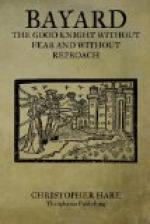The trumpet was sounded to command silence, and St. Quentin said: “My lords who are here assembled, and especially those who have been in the Tourney of which Messire Pierre Bayard has given the prizes for two days ... we would have you know that after due inquiry of the virtuous and brave gentlemen who were present and saw the contests, and of the noble ladies here present ... we have found that although each one has very well and honestly done his duty, yet the common voice is that the lord of Bayard has done best in these two days; wherefore the lords and ladies leave to him the honour of giving the prizes where it seems good to him.” Then he added: “My lord of Bayard, decide where you will give them.” The young knight blushed modestly and was quite troubled. Then he said:
“My lord, I do not know why this honour should come to me, for I think that others have deserved it more than I. But as it pleases the lords and ladies that I should be judge, I hope that the gentlemen, my companions, will not be displeased if I give the prize for the first day to my lord of Bellabre, and for the second day to the Captain David of Scotland.” He therefore gave the gold bracelet to his friend Bellabre, and the diamond to the Scotch Captain David, and his decision was greatly applauded. There was again feasting and dancing afterwards, and the ladies could not say enough in praise of their gallant young host. We may imagine the penniless condition in which all this extravagant generosity left him, but his extreme liberality appears to have been one great feature of his character which made him beloved through life by all who had to do with him.
He never could see one of his companions thrown without giving him another horse; if he had a crown left, every one shared it. He never refused the request of any man if he could possibly grant it, and in his gifts was always gentle and courteous. His chronicler makes a special point of his piety from early youth; the first thing when he rose in the morning was always a prayer to God, as he had promised his mother.
[Illustration: Louis XII king of France from a medallion.]
CHAPTER III
During two years Bayard remained with the garrison at Aire, and made great progress in all warlike training. At the end of this time, in the year 1494, Charles VIII. undertook his first expedition to Italy, and as the company of the Count de Ligny was commanded to join him, young Bayard looked forward with great delight to his first taste of real warfare.
The young King of France, in his eager desire for military glory, forsook the wise policy of his father, Louis XI., and resolved to claim the kingdom of Naples, in assertion of the rights bequeathed to him by Rene of Anjou. In order to prevent any opposition from Spain he yielded to King Ferdinand the provinces of Roussillon and Cerdagne, and on the same principle gave up to the Emperor Maximilian, Artois and Franche-Comte. Having made these real sacrifices as the price of a doubtful neutrality, he set forth on his wild dreams of conquest at a distance, which could be of no permanent advantage to him.




